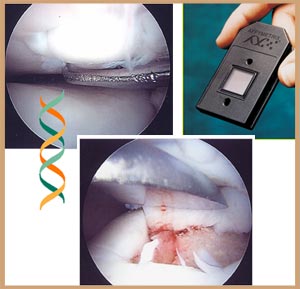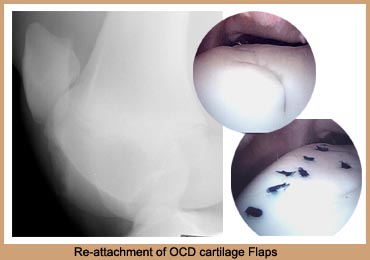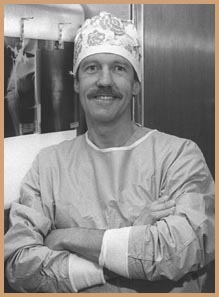Osteochondritis dissecans (OCD)
 Osteochondritis dissecans is a common and debilitating cartilage disease in growing animals and children. The primary lesion involves detached sheets of cartilage that destabilize the joint surface, resulting in pain, dysfunction, and later osteoarthritis. Studies using the horse as the primary focus have determined that the syndrome involves aberrations in the molecular mechanisms that control cartilage growth and maturation. Several studies funded by the Morris Animal Foundation indicate that elevations in several proteins that control the normal pace of cartilage growth in the articular surface, as well as the growth plate (physis),can result in excessive cartilage thickening and subsequent detachment. More recent studies have used gene chip microarray technology to expand our search of the number of known proteins that dysfunction in the development of OCD. These studies utilize tissue from surgical specimens or postmortem samples from animals with advanced OCD lesions.
Osteochondritis dissecans is a common and debilitating cartilage disease in growing animals and children. The primary lesion involves detached sheets of cartilage that destabilize the joint surface, resulting in pain, dysfunction, and later osteoarthritis. Studies using the horse as the primary focus have determined that the syndrome involves aberrations in the molecular mechanisms that control cartilage growth and maturation. Several studies funded by the Morris Animal Foundation indicate that elevations in several proteins that control the normal pace of cartilage growth in the articular surface, as well as the growth plate (physis),can result in excessive cartilage thickening and subsequent detachment. More recent studies have used gene chip microarray technology to expand our search of the number of known proteins that dysfunction in the development of OCD. These studies utilize tissue from surgical specimens or postmortem samples from animals with advanced OCD lesions.
 Additionally, the laboratory has established methods to re-attach OCD cartilage flaps that have not degenerated to become arthritic, and current studies aim to combine cell grafting with re-attachment methods to improve overall durability.
Additionally, the laboratory has established methods to re-attach OCD cartilage flaps that have not degenerated to become arthritic, and current studies aim to combine cell grafting with re-attachment methods to improve overall durability.



 1.
1.